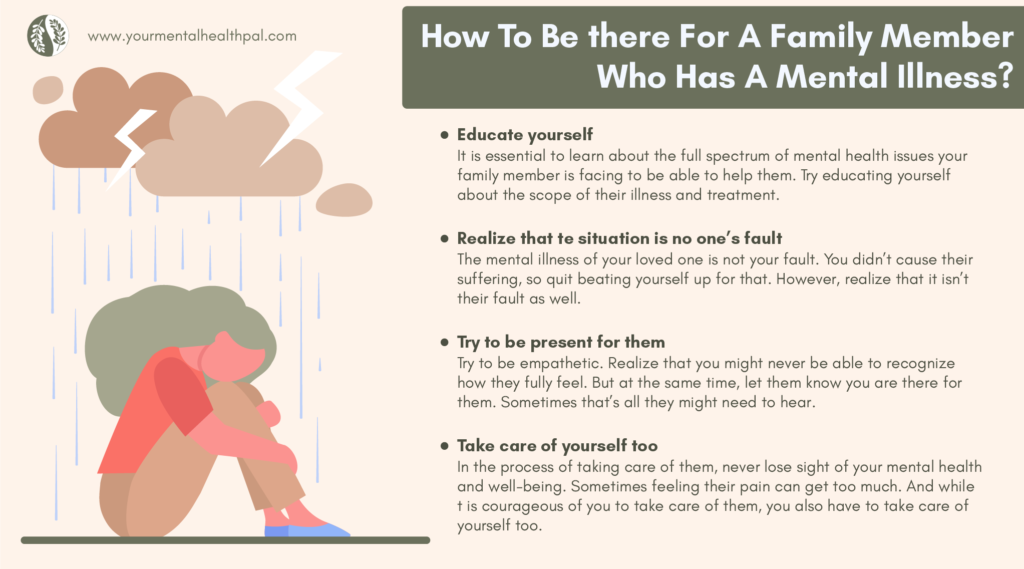
According to the World Health Organization (WHO), one in five Americans has some mental disorder at any given time, and almost half will have them at some point. Nearly 100 million Americans have a close family member with a severe mental disorder. Out of the top leading causes of disability, half are psychiatric. It is estimated that only 10-20% of individuals requiring care receive it in care facilities; the rest receive their primary care within the family. Hence, it is essential to understand how mental health affects family relationships.
Devoted to their suffering member, a family is the most significant support for healing. However, they are always addressed as just that, ‘the support systems’. These bereaved parents, daughters and sons, and spouses deserve attention and support as well.
Mental health issues can create doubts, confusion, and chaos in families. The illness dominates the family through fear, helplessness, or incapacity. Instability, separation, and abandonment are all consequences of mental health illness.
Let’s dive deeper into the connection between mental health and families.
How do mental health issues affect family relationships?
Mental illnesses do not just affect the person suffering from them. Every family member might be affected when someone close suffers a mental illness. Hence, along with the primary sufferer to his loved ones, mental illnesses consume entire households.
A study published by Issues in Mental Health Nursing found that family members of people suffering from severe depression might also suffer significant consequences. They can experience emotions of guilt, burnout, psychological stress, and anxiety.
The answer to ‘how mental health affects family relationships’ can be more clear from the statistics regarding how parental depression affects children. Some researchers point toward the fact that children growing up with parents having depressive disorders might be more likely to develop them in the later stages of their lives.
- As per a study published by MDPI, babies with depressed mothers tend to cry more often and profusely.
- Yale Medicines’ research found that children with depressed caregivers or parents tend to have more behavioral issues than others.
- According to a study by Carrie W. Rishel, children with depressed parents and caregivers are more prone to anxiety and depressive disorders.
Among couples, mental illnesses can cause adverse effects on intimacy, bonding, and communication. The person suffering from the illness might withdraw and isolate themselves or need greater support and reassurance. Partners could feel like they are walking on eggshells which might cause stress and anxiety.
While deducing how mental health affects family relationships, we cannot neglect the financial aspect of the issue. Along with psychological problems, the financial burden associated with mental illnesses might cause ripples in families. Spending on mental health treatment in America reached $ 225 billion in 2019. Families on the lower end of financial security may suffer more because of the ever-increasing costs of treatment for mental illnesses.
Discovering that someone you love has a mental illness can thus be frightening and scary. And even though downfall and fallouts in relationships might be a norm, they can be prevented with compassion, communication, and understanding. So if you are dealing with the tumultuous lows and minute highs of having a family member with a mental illness (bless you), here is some advice to help you.
How to be there for a family member who has a mental illness?

Struggling with some form of mental illness does not render your family member useless. It does not mean that they are insane. They don’t need to be guided and bossed around continuously. All they need is love and acceptance for exactly who they are. Here’s a list of reminders to help you navigate through these challenging times:
1. Educate yourself
It is essential to learn about the full spectrum of mental health issues your family member is facing to be able to help them. Try educating yourself about the scope of their illness and treatment. Knowing about their conditions and the channels for help available for them might help you provide better care and treatment.
2. Realize that the situation is no one’s fault.
The mental illness of your loved one is not your fault. You didn’t cause their suffering, so quit beating yourself up for that. However, realize that it isn’t their fault as well. It’s not like they just woke up one fine day and chose to be ill. Mental health issues are proper diagnosable illnesses, just like the physical ones. People suffering from them fight an ongoing battle that might last for a lifetime.
3. Try to be present for them
Try to be empathetic. Realize that you might never be able to recognize how they fully feel. But at the same time, let them know you are there for them. Sometimes that’s all they might need to hear. Sometimes, it is the little things that mean the most.
Be patient on the days that their symptoms worsen or when they feel lost. Try not to lose your compassion on the hardest of days.
4. Take care of yourself, too
In the process of taking care of them, never lose sight of your mental health and well-being. Taking care of a family member dealing with mental health issues can also be taxing for the caregivers. Sometimes feeling their pain can get too much. And while it is courageous of you to take care of them, you also have to take care of yourself too. Remember that if you can’t tend to your own needs, you might not be able to help them fully as well.
Remind yourself not to take up the sole responsibility for them. There are some things that they have to achieve themselves. And even though you can choose to be by their side through it all, you cannot actually do it for them.
Conclusion:
People dealing with mental health issues and families suffering from them are fighting a difficult battle together. With proper education, stigma reduction, and compassion, their journeys might become a tad bit easier.
We hope you now realize ‘how mental health affects family relationships.’ If you are going through these situations, remember to prioritize the well-being of the person suffering and yourself. To know more about how to practice mental well-being, click here.
To build a supportive society and know more about mental health, subscribe to Your Mental Health Pal.

